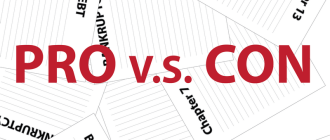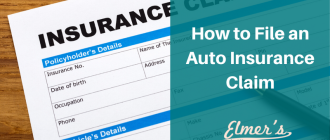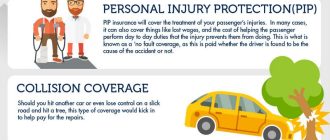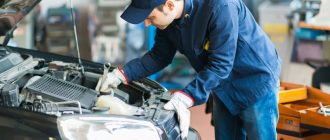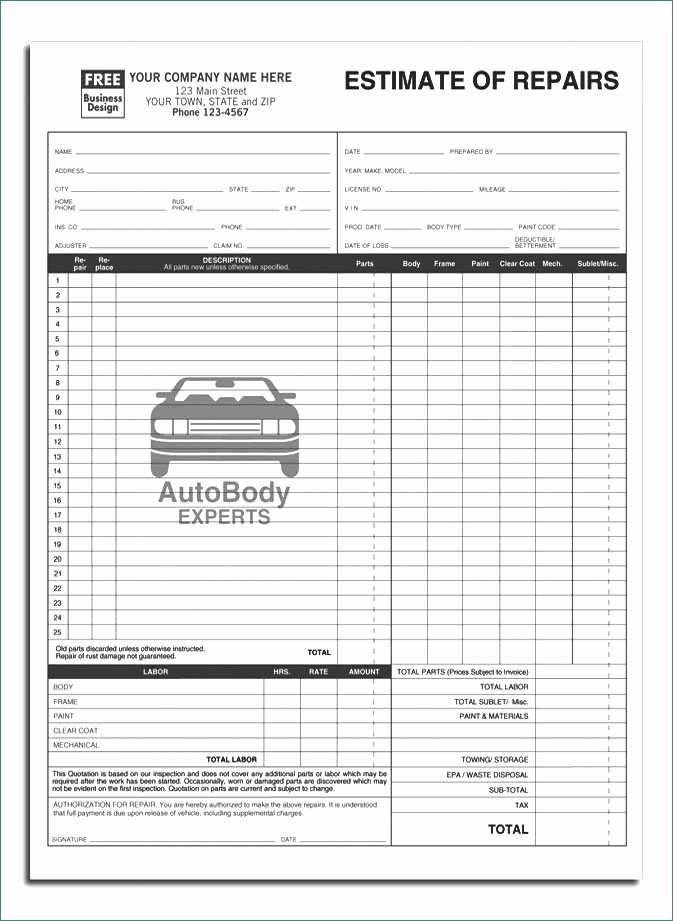
How to Get a Car Repair Estimate After an Accident
After a car accident, getting a repair estimate is a crucial step towards getting your vehicle back on the road. Whether it’s a minor fender bender or a major collision, understanding the process of getting an estimate is essential to ensure you receive a fair and accurate assessment of the damage.
First and foremost, it’s important to find a reputable body shop or auto repair shop to assess the damage to your car. Look for a shop that has experience with similar repairs and has a good reputation for providing reliable estimates. Once you have selected a shop, schedule an appointment to bring your car in for an inspection.
During the inspection, a qualified technician will thoroughly assess the damage to your car. They will examine both the visible damage and any underlying issues that may not be immediately apparent. This will allow them to provide an accurate estimate that takes into account all necessary repairs.
After the inspection, the repair shop will provide you with an estimate that outlines the cost of the repairs. This estimate should include a detailed breakdown of the parts and labor required to fix your car. It’s important to carefully review the estimate and ask any questions you may have before proceeding with the repairs.
Once you have received the estimate, you can then decide whether to proceed with the repairs. If the estimate seems reasonable and the repair shop has a good reputation, you can authorize the repairs to be completed. However, if you have any concerns or doubts about the estimate, it may be worth seeking a second opinion from another shop before making a final decision.
Getting a car repair estimate after an accident can be a daunting task, but by following these steps, you can ensure that you receive a fair and accurate assessment of the damage. Remember to choose a reputable repair shop, carefully review the estimate, and seek a second opinion if necessary. By doing so, you can get your car back on the road and back to its pre-accident condition.
Understanding the Importance of Car Repair Estimates
After a car accident, one of the first things you will need to do is get a repair estimate. A repair estimate is an assessment of the damage done to your car and an estimation of the cost to fix it. This is a crucial step in the process of getting your car repaired and getting back on the road.
How to get a car repair estimate:
- Contact your insurance company: After an accident, you should contact your insurance company to report the incident. They will guide you through the claims process and help you get a repair estimate.
- Choose a repair shop: Your insurance company may have preferred repair shops that they work with. Alternatively, you can choose a repair shop on your own. Either way, you will need to take your car to the shop for the estimate.
- Assessment of damage: The repair shop will inspect your car and assess the damage. They will identify what needs to be repaired or replaced and determine the total cost of the repairs.
- Written estimate: The repair shop will provide you with a written estimate that outlines the details of the repairs and the associated costs.
Why is a car repair estimate important?
- Budgeting: A repair estimate gives you an idea of how much money you will need to spend on the repairs. This allows you to budget accordingly and plan for the expenses.
- Insurance coverage: An estimate is necessary for your insurance company to determine the cost of repairs and whether they will cover them.
- Comparison shopping: Getting multiple estimates allows you to compare prices and determine if you are getting a fair deal. It also gives you the opportunity to choose the repair shop that offers the best value for your money.
- Documentation: A repair estimate serves as an official document that outlines the details of the damage and the proposed repairs. It can be used for insurance purposes and can be helpful if you decide to sell the car in the future.
In conclusion, getting a car repair estimate after an accident is crucial. It helps you understand the extent of the damage to your car, the cost of repairs, and allows you to plan and budget accordingly. Additionally, it is important for insurance purposes and provides documentation for the repairs done to your car.
Steps to Take After an Accident to Get a Car Repair Estimate
- Call the police: After a car accident, it is important to call the police to report the incident. They will document the details of the accident and provide you with an accident report number, which you will need when filing an insurance claim and getting a car repair estimate.
- Contact your insurance company: Notify your insurance company as soon as possible about the accident. They will guide you through the next steps and may recommend preferred repair shops where you can get an estimate.
- Choose a repair shop: Your insurance company may have a list of approved repair shops. You can also opt for a shop of your choice. It’s important to select a reputable repair shop that is experienced in handling your car’s make and model.
- Schedule a visit: Once you have chosen a repair shop, schedule a visit to get a car repair estimate. Bring your damaged vehicle to the shop so that they can assess the extent of the damage and provide an accurate estimate for the repairs.
- Obtain multiple estimates: It’s a good idea to get multiple estimates from different repair shops to compare prices and services. This will help you make an informed decision and ensure you’re getting a fair estimate.
- Review the estimate: Once you receive the estimates, review them carefully. Make sure they include all the necessary repairs and parts needed to restore your car to its pre-accident condition. If anything is unclear, don’t hesitate to ask for clarification from the repair shop.
- Consider additional inspections: In some cases, additional damage may be discovered during the repair process. To avoid unexpected surprises, consider getting a pre-repair inspection to ensure all damages are properly addressed in the estimate.
- Negotiate the estimate: If you feel that the repair estimate is too high or if you have obtained a lower estimate from another shop, you can try negotiating with the repair shop. They may be willing to adjust the estimate to win your business.
- Approve the estimate: Once you are satisfied with the estimate and have finalized any negotiations, you can give the repair shop your approval to proceed with the repairs.
- Review the repairs: After the repairs are completed, carefully inspect your car to ensure that all the necessary repairs have been made and that the quality of work meets your expectations.
Remember, it’s important to take these steps promptly after an accident to ensure a smooth process and to get an accurate car repair estimate.
Finding a Reliable Auto Body Shop for Your Repair Estimate
After getting into an accident, one of the first things you need to do is find a reliable auto body shop to get an estimate for the repair. Choosing the right shop is crucial to ensure that your car is repaired properly and that you are not overcharged for the services.
Here are some steps on how to find a reliable auto body shop for your repair estimate:
- Ask for recommendations from friends and family who have had similar car repairs done in the past. Their personal experiences can give you valuable insights into the quality of service provided by different body shops.
- Check online reviews and ratings of local auto body shops. Websites like Yelp, Google Maps, and Angie’s List provide reviews from real customers, helping you gauge the reputation and reliability of different shops.
- Contact your insurance company for a list of recommended auto body shops. Insurance companies often have partnerships with trusted repair shops and can provide you with a list of options to choose from.
- Visit the shops in person to get a feel for their professionalism and cleanliness. A well-maintained shop with organized workspaces signals that they take their work seriously.
- Ask the shop for references or examples of past repairs they have completed. This will give you an idea of their expertise and the quality of their work.
- Inquire about the shop’s certifications and qualifications. Look for shops that are certified by reputable organizations like the National Institute for Automotive Service Excellence (ASE) or the Inter-Industry Conference on Auto Collision Repair (I-CAR).
- Request a detailed written estimate from the shop. The estimate should include the cost of parts, labor, and any additional fees or charges.
- Compare estimates from multiple shops to ensure you’re getting a fair price for the repair. However, keep in mind that the cheapest option is not always the best; consider the reputation, qualifications, and experience of the shop as well.
- Trust your instincts. If something feels off or you’re not comfortable with a particular shop, it’s better to look elsewhere. Your peace of mind and satisfaction are important.
By following these steps, you can find a reliable auto body shop for your repair estimate and have confidence that your car will be repaired correctly and at a fair price.
Questions to Ask When Getting a Car Repair Estimate
When it comes to getting a car repair estimate after an accident, it’s important to ask the right questions to ensure you have a clear understanding of the process and what to expect. Here are a few key questions to ask:
- How long will the repair take?
- What is the total cost of the repair?
- Are there any alternative repair options?
- Do you provide a warranty for the repair?
- Can you provide a written estimate?
- Will there be any additional fees or charges?
- Do you work with insurance companies?
- Can you provide references from past customers?
Understanding the timeline for the repair can help you plan your transportation needs. Make sure to inquire about any potential delays and factors that may affect the repair timeline.
Getting a clear estimate of the repair costs is crucial for budgeting purposes. Ask for a detailed breakdown of the costs, including parts, labor, and any additional fees.
In some cases, there might be alternative repair options available. Ask if there are any alternative parts or methods that can achieve the same results at a lower cost.
Having a warranty for the repair work can give you peace of mind. Inquire about the warranty coverage, duration, and any limitations or conditions.
Having a written estimate ensures that you have a documented record of the agreed-upon repair costs and scope of work. Request a written estimate to avoid any misunderstandings down the line.
Ask if there are any potential additional fees or charges that may arise during the repair process. This will help you avoid any unexpected costs.
If you’re filing an insurance claim, it’s important to know if the repair shop works with insurance companies. They can help facilitate the claim process and alleviate some paperwork burden.
Asking for references can give you insights into the repair shop’s reputation and the quality of their work. Reach out to past customers to get their feedback and gauge their satisfaction.
By asking these questions, you can ensure that you have a comprehensive understanding of the repair process and make an informed decision about where to get your car repaired after an accident.
Factors That Affect the Cost of a Car Repair Estimate
When you need to get a car repair estimate after an accident, there are several factors that can affect the cost of the repairs. Understanding these factors can help you get a better idea of how much you can expect to pay for the necessary repairs.
- Extent of Damage: One of the main factors that will affect the cost of a car repair estimate is the extent of the damage to your vehicle. If the damage is extensive and requires significant repairs, the overall estimate is likely to be higher.
- Parts and Labor: The cost of parts and labor will also play a role in determining the car repair estimate. Some parts may need to be replaced entirely, while others may be repairable. Additionally, labor costs can vary depending on the complexity of the repairs.
- Type of Vehicle: The type of vehicle you have can also affect the cost of a car repair estimate. Luxury or high-performance vehicles often require specialized parts and labor, which can be more expensive than standard vehicles.
- Location: The location of the repair shop can also impact the cost of a car repair estimate. Repair shops in urban areas or areas with a high cost of living may have higher labor rates, which can contribute to a higher overall estimate.
- Insurance Coverage: If you have insurance coverage for the repairs, the terms of your policy will also affect the cost. Deductibles, coverage limits, and specific repair shop requirements can all play a role in the final estimate.
Knowing the factors that can affect the cost of a car repair estimate can help you make more informed decisions when it comes to getting your vehicle repaired after an accident. By understanding these factors, you can better anticipate the expenses involved and plan accordingly.
The Role of Insurance in the Car Repair Estimate Process
When it comes to getting a car repair estimate after an accident, insurance plays a significant role. Insurance companies are typically involved in the process to assess the damages, determine the cost of repairs, and ultimately cover the expenses. Here’s how insurance affects the car repair estimate process:
- Reporting the Accident: After a car accident, it’s essential to report the incident to your insurance company as soon as possible. They will guide you through the claim process, provide instructions on getting a repair estimate, and may even recommend specific auto repair shops.
- Choosing an Auto Repair Shop: Insurance companies often have a list of approved repair shops or direct repair programs (DRPs) that they work with. These shops have pre-negotiated rates and agreements with the insurance company, making the repair estimate process smoother. However, policyholders have the right to choose any repair shop they prefer, although there may be differences in the estimates.
- Estimate Assessment: Once you choose a repair shop, they will assess the damages and provide an estimate to the insurance company. This estimate should include the cost of parts, labor, and any additional necessary repairs or replacements. The insurance adjuster will review the estimate and determine if it meets their guidelines and if the costs are reasonable.
- Negotiations: In some cases, the insurance company may negotiate the repair estimate with the repair shop. This can involve price adjustments, the use of aftermarket parts instead of original manufacturer parts, or alternative repair methods. The goal is to reach an agreement that satisfies both parties.
- Approval and Payment: Once the repair estimate is approved, the insurance company will issue payment directly to the repair shop or policyholder, depending on the arrangement. Keep in mind that insurance policies may have deductibles, and policyholders are typically responsible for paying their deductible before the insurance coverage kicks in.
In conclusion, insurance is a crucial factor in the car repair estimate process after an accident. It provides support, guidance, and financial coverage to ensure that the necessary repairs are made promptly and efficiently. By understanding the role of insurance in this process, policyholders can navigate the claims process with confidence and get their vehicles back on the road as soon as possible.
Negotiating the Cost of a Car Repair Estimate
When you get a car repair estimate, it’s important to remember that the initial cost is not set in stone. There may be room for negotiation to try and get the cost down. Here are a few tips on how to negotiate the cost of a car repair estimate:
- Research the average costs: Before negotiating, it’s helpful to know what the average costs are for the type of repair you need. Research online or ask for recommendations from friends to get an idea of the typical price range for the repair.
- Get multiple estimates: Don’t settle for the first estimate you receive. Shop around and get estimates from different repair shops. This will give you a better idea of what a fair price is and provide you with options for negotiation.
- Ask for itemized breakdown: When receiving an estimate, ask for an itemized breakdown of the costs. This will allow you to see exactly what you’re being charged for and identify any potential areas for negotiation.
- Highlight your loyalty: If you have been a loyal customer to a particular repair shop, mention it during the negotiation process. They may be more willing to offer you a discount or reduce the price as a sign of appreciation for your continued business.
- Consider alternative solutions: If the cost of the repair estimate is still too high, ask the repair shop if there are any alternative solutions that could help lower the price. For example, they may be able to use aftermarket parts instead of OEM parts or suggest a less expensive repair option.
- Be polite and respectful: Remember to always approach negotiations with a polite and respectful attitude. Being rude or demanding is unlikely to help you get a better deal. Instead, try to build a good rapport with the repair shop and explain your situation in a calm and reasonable manner.
- Consider the long-term: While it can be tempting to focus solely on the initial cost, consider the long-term implications of the repair. For example, paying a slightly higher price for a repair using high-quality parts may save you money in the long run by preventing future issues.
By following these tips and being proactive in negotiating the cost of a car repair estimate, you may be able to lower the overall price and potentially save money.
Understanding the Timeline for Car Repair Estimates
After a car accident, it is important to get a repair estimate as soon as possible. Knowing how to go about getting an estimate and understanding the timeline for receiving it can help you get your car repaired in a timely manner.
Step 1: Contact Your Insurance Company
If you’ve been in an accident, the first step is to contact your insurance company. They will guide you through the claims process and provide you with information on how to proceed with getting an estimate. Make sure to provide them with all the necessary details about the accident and the damage to your car.
Step 2: Schedule an Inspection
Once you’ve contacted your insurance company, they will typically instruct you to take your car to a designated repair shop for an inspection. This can be one of their preferred shops or a shop of your choice. Be sure to mention that you need an estimate when scheduling the inspection.
Step 3: Getting the Estimate
During the inspection, the repair shop will assess the damage to your car and provide you with an estimate for the repairs. The estimate will detail the cost of parts, labor, and any additional charges. Make sure to ask for a written estimate, as this will be necessary for filing your insurance claim.
Step 4: Submitting the Estimate
Once you have the written estimate, submit it to your insurance company along with any other required documentation. This can typically be done online or through the mail, depending on your insurance provider’s guidelines. Make sure to follow up with your insurance company to ensure that they have received your estimate and are processing it.
Step 5: Approval and Repair
After your insurance company reviews the estimate, they will either approve or deny it. If approved, they will provide you with details on how to proceed with the repairs. If denied, they will explain the reasons for the denial and may request additional documentation or a second estimate. Once approved, you can schedule the repairs and get your car back on the road.
The Timeline
The timeline for receiving a car repair estimate can vary depending on various factors such as the extent of the damage, the availability of the repair shop, and the responsiveness of your insurance company. In general, it is best to contact your insurance company and schedule an inspection as soon as possible after the accident. This will help expedite the process and ensure that repairs can be completed in a timely manner.
Remember, the most important thing is to prioritize your safety after an accident. Once you have taken the necessary steps to ensure your well-being, getting a car repair estimate and starting the repair process should be your next priority. By understanding the timeline and following the steps outlined above, you can get your car back on the road as quickly as possible.
Alternatives to Traditional Car Repair Estimates
After an accident, getting a car repair estimate is crucial to assess the damage and determine the cost of repairs. However, there are alternatives to traditional methods of obtaining estimates that can be both convenient and cost-effective.
1. Online Estimate Tools: Many car repair shops and insurance companies offer online estimate tools that allow you to input information about the damage and receive an estimate remotely. These tools are usually easy to use and provide a quick estimate without the need for an in-person inspection.
2. Mobile Estimate Apps: Some repair shops and insurance companies have developed mobile apps that allow you to take photos of the damage and submit them for an estimate. These apps use advanced technology to assess the damage and provide an accurate estimate without the need for a physical inspection.
3. Virtual Inspections: With advancements in technology, virtual inspections are becoming more common. Through video call or online platform, a repair shop technician can guide you to take detailed photos and videos of the damaged areas. These can then be used to provide an estimate without the need for an in-person visit.
4. Third-Party Inspection Services: In some cases, you may opt to hire a third-party inspection service to assess the damage and provide an estimate. These services employ experienced technicians who can provide an unbiased opinion and estimate the cost of repairs.
5. Local Repair Shop Referrals: Asking for recommendations from friends, family, or local community groups can be an alternative way to get a car repair estimate. Person-to-person referrals can provide insight into reputable repair shops and help you get an accurate estimate from a trusted source.
Tips for Preventing the Need for Future Car Repair Estimates
Keeping your car well-maintained and taking preventative measures can help reduce the likelihood of needing future car repairs. Here are some tips to help you avoid costly repairs down the road:
- Regular Maintenance: Follow your car manufacturer’s recommended maintenance schedule. This includes regular oil changes, tune-ups, and inspections. Regular maintenance helps identify potential issues early on and prevents them from worsening.
- Safe Driving: Practice safe driving habits to minimize the risk of accidents and unnecessary damages. Avoid aggressive driving, follow traffic laws, and maintain a safe distance from other vehicles.
- Proper Tire Care: Monitor your tire pressure regularly and ensure they are properly inflated. This helps improve fuel efficiency, tire lifespan, and overall vehicle performance.
- Check Fluid Levels: Regularly check and top off essential fluids such as engine oil, coolant, brake fluid, and transmission fluid. Maintaining optimal levels helps prevent engine damage and other mechanical issues.
- Be Mindful of Warning Signs: Pay attention to any warning signs or unusual noises your car may be exhibiting. If you notice anything out of the ordinary, have it inspected by a professional mechanic to diagnose and address any potential issues.
- Keep it Clean: Regularly wash and wax your car to protect the paint and prevent rust. Cleaning the interior regularly can also help maintain the value of your vehicle.
- Choose Quality Parts and Service: When it comes to repairs and replacements, choose reputable mechanics and quality parts. This can help prevent future issues and ensure the longevity of your car.
By following these tips, you can significantly reduce the chances of needing future car repairs and the associated costs. Remember, prevention is key when it comes to maintaining your car’s performance and prolonging its lifespan.
FAQ:
What should I do if my car is damaged in an accident?
If your car is damaged in an accident, you should take certain steps. Firstly, make sure that everyone involved in the accident is safe and call emergency services if necessary. Then, exchange information with the other driver(s) involved, including names, contact information, and insurance details. Document the accident by taking photos, and if there are any witnesses, gather their contact information too. Finally, contact your insurance company and report the accident.
Do I need to get a repair estimate after an accident?
Yes, it is important to get a repair estimate after an accident. The repair estimate will give you an idea of the cost to fix the damages to your car. It will also provide documentation for your insurance claim. Getting an estimate will help you understand the extent of the damage and determine if it is worth repairing or if your car should be considered a total loss.
Who provides the repair estimate after an accident?
The repair estimate after an accident can be provided by a variety of sources. You can take your car to a trusted mechanic or body shop, and they will assess the damage and provide an estimate. Insurance companies may also send an adjuster to assess the damage and provide an estimate. In some cases, you may need to obtain multiple estimates to compare prices and determine the best course of action.
How long does it take to get a repair estimate after an accident?
The time it takes to get a repair estimate after an accident can vary. It depends on factors such as the availability of the mechanic or body shop, the extent of the damage, and the workload of the insurance adjusters. In some cases, you may be able to get an estimate on the same day, while in others, it may take a few days or even longer. It is best to check with the repair facility or your insurance company for an estimated timeline.
What should I consider when reviewing a repair estimate?
When reviewing a repair estimate, there are several factors to consider. First, make sure that all the damages to your car are listed and accounted for. Check the prices of the individual repairs and make sure they are reasonable and in line with local market rates. Look for any hidden or additional charges, such as disposal fees or administrative fees. Finally, consider the reputation and experience of the repair facility or mechanic providing the estimate.
What should I do if I’ve been involved in a car accident?
If you’ve been involved in a car accident, the first thing you should do is ensure your safety and the safety of others involved. Move to a safe location if possible and call for medical help if anyone is injured. After that, you should exchange information with the other driver(s) involved, including names, contact information, and insurance details. It’s also important to document the accident by taking photos of the vehicles and the scene, and gathering any witness statements. Finally, contact your insurance company to report the accident and initiate the claims process.
How can I get a car repair estimate after an accident?
There are a few ways to get a car repair estimate after an accident. One option is to take your vehicle to a local auto body shop or mechanic and have them assess the damage and provide an estimate. Another option is to use an online estimating tool, where you can input information about the damage and receive an estimate without leaving your home. Additionally, some insurance companies have their own preferred repair shops that can provide estimates. It’s important to gather multiple estimates to ensure you’re getting a fair price for the repairs.
